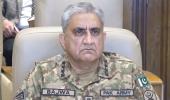No prime minister in Pakistan's recent history has survived long in office after appointing an ISI chief who did not have the army chief's confidence.

Despite a no vote of no confidence against a sitting prime minister ever having succeeded before in Pakistan, Imran Khan's fall appears imminent.
He is himself to blame for this predicament.
The betrayal by the Pakistan Tehrik e Insaf (PTI)'s own members and dithering of allies are an outcome of mismanagement and failure to learn from the lessons of history and understand the ethos of politics in a country still experimenting with an imperfect or fragile democracy.
The collapse of this hybrid construct of a military backed civilian dispensation, brought in during the 2018 election, became inevitable after the October-November, 2021 imbroglio over the Inter Services Intelligence (ISI) chief's appointment.
When Imran insisted on Lieutenant General Faiz Hamid's retention as the ISI chief against army chief General Qamar Javed Bajwa's appointment of Lieutenant General Nadeem Ahmed Anjum, he was tempting fate.
No prime minister in Pakistan's recent history has survived long in office after appointing an ISI chief who did not have the army chief's confidence. Imran may be no exception.
As soon as the military establishment's 'neutrality' became clear, the Opposition parties got together.
The Pakistan Democratic Movement played its cards astutely.
People's Party of Pakistan President Asif Zardari expertly negotiated various stages of deals for first getting together the defectors, then working out options for the aftermath, cementing in the process their hitherto rather fragile unity.
Maulana Fazlur Rehman of the Jamiat Ulema Islam and the PPP's Bilawal Bhutto Zardari played their roles enthusiastically enough in upping the public tirade against Imran Khan.
Pakistan Muslim League, Nawaz President Nawaz Sharif continues to hold the puppet strings from exile in London while his brother Shahbaz Sharif is being promoted as the 'acceptable' prime ministerial face.
The ambivalent Chaudhrys of Gujrat appear to have been roped in with the bait of the Punjab chief minister's office.
Allies of the ruling PTI signaled their willingness to join this emerging bandwagon.
The claimed number of MNAs (members of the national assembly, Pakistan's parliament) with the Opposition now comfortably exceeds the required 172 votes, possibly to well over 200.
Shenanigans of the political discourse descended to unforeseen depths after the tabling of the no confidence motion on March 8, 2022 with more than the required (20%) signatures (over a hundred MNAs signed up).
Disregarding conventional political civility, Imran Khan disparaged defecting party members at public rallies in harsh and unparliamentary language.
The Sindh house in Islamabad was stormed as it was housing a dozen of the expected defectors.
Houses of sitting MNAs in Punjab and Karachi were surrounded by a handful of PTI loyalists threatening future retribution.
An openly partial Speaker Asad Qaiser delayed convening of the national assembly for the vote, two days beyond the mandatory 14 days after the notice tabling, because the venue was pre-assigned for the OIC foreign ministers's meet.
All these moves seem not to have staved off the ouster.
The PM's close confidantes were sent out as emissaries to the military establishment, ostensibly to bury the hatchet.
Imran met General Bajwa at least twice.
Apparently, the army chief cautioned the prime minister to refrain from resorting to any unconstitutional steps or moves which could lead to mass confrontation.
The PTI has now shifted its planned rally for March 27 from Islamabad's D Chowk to a location more distant from the central parliamentary/presidential vista.
However, these meetings did engender speculation about possible olive branches being extended to General Bajwa, to help entice back errant PTI MNAs, with a counter assurance not to appoint Lieutenant General Faiz Hamid army chief after General Bajwa's term ends in November.
A spanner in the works has also been thrown in through a rather desperate reference moved to Pakistan's supreme court, questioning the legality of the defectors' votes under article 63 A of the Pakistan constitution and 'conscience voting' under article 95.
This could delay the outcome in the vote of no confidence.
Chief Justice Omar Ata Bandial initially heard arguments in a two-member bench, where Justice Munib Akhtar ruled that votes had to be cast according to a party's diktat.
This observation created a perception of a possible, last minute, bail out of the Imran Khan government.
Now the chief justice has convened a larger five member bench to take up the case from March 24.
Surprisingly, this bench excludes senior judges like Justice Qazi Faiz Isa, known for their independence.
'The Ides of March' (2022) seem to have arrived in Pakistan though portends are that we may not get an early answer for whom 'the bell tolls', or when.
Feature Presentation: Aslam Hunani/Rediff.com











 © 2025
© 2025